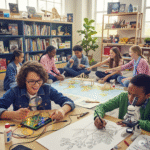Shifting the Perspective: From Exam Factories to Knowledge Centers
Introduction: Rethinking the Purpose of Education
In India, education is often seen as a direct route to secure jobs and social status. This perception has turned schools into high-pressure environments focused on rote memorization and exam results, sidelining the transformative power of knowledge-building. A shift towards viewing education as a process of developing understanding, curiosity, and skills can revolutionize school experiences, fostering holistic growth and lifelong learning.
1. The Current State of Education in India
Exam-Centric Culture
- A 2022 ASER Report highlights that 74% of rural students in Grade 8 can read Grade 2-level text, but critical thinking and application-based skills remain underdeveloped.
- The pressure of board exams and competitive entrance tests, like JEE and NEET, pushes students toward rote learning rather than fostering creativity and analytical skills.
Gaps in Skill Development
- According to the India Skills Report 2022, 50% of Indian graduates lack employability skills, such as problem-solving, communication, and adaptability—skills essential in today’s dynamic world.
- The heavy focus on academics often leaves little room for extracurricular activities that encourage teamwork, leadership, and innovation.
2. Knowledge-Building: A Transformative Approach
What is Knowledge-Building?
- Knowledge-building shifts the focus from memorizing facts to developing a deep understanding of concepts, connecting ideas, and applying them to real-world problems.
- It emphasizes curiosity, exploration, and critical thinking, enabling students to become proactive learners rather than passive receivers of information.
Benefits of Knowledge-Centric Education
- Critical Thinking: Encourages students to question, analyze, and synthesize information, preparing them for diverse life challenges.
- Adaptability: Builds the skills needed to navigate rapidly changing job markets, as emphasized by the World Economic Forum.
- Lifelong Learning: Cultivates a mindset of continuous education, helping students stay relevant and engaged throughout their lives.
3. The Impact of Knowledge-Building on School Experiences
Enhancing Student Engagement
- Schools that prioritize knowledge-building create dynamic classrooms where students are active participants in their learning journey.
- Project-Based Learning (PBL), as implemented in schools like Riverside School Ahmedabad, encourages students to work on real-world problems, fostering creativity and teamwork.
Reducing Academic Stress
- By focusing on understanding rather than rote memorization, students experience reduced anxiety around exams. They see learning as enjoyable and meaningful rather than as a high-stakes race.
Promoting Holistic Growth
- Knowledge-building integrates academic learning with emotional, social, and ethical development, creating well-rounded individuals. Programs like Social-Emotional Learning (SEL), now adopted by several CBSE schools, highlight the importance of empathy, resilience, and collaboration.
4. Research-Backed Evidence for Knowledge-Building
Global Insights
- A UNESCO 2021 Report emphasizes that quality education involves not just knowledge transfer but the cultivation of critical thinking and creativity.
- Finland’s education system, often cited as the world’s best, focuses on experiential learning and student autonomy, resulting in high levels of student satisfaction and performance.
Indian Perspectives
- The National Education Policy (NEP) 2020 advocates for reducing rote learning and emphasizing conceptual understanding. It promotes multidisciplinary education and experiential learning to prepare students for the future.
- A pilot study by Azim Premji Foundation found that classrooms that adopt active learning methods see a 30% increase in student engagement and comprehension.
5. How Indian Schools Can Foster Knowledge-Building
Curriculum Design
- Shift from textbook-based rote learning to a curriculum that integrates project work, real-world applications, and interdisciplinary subjects.
- Introduce mandatory modules on life skills, financial literacy, and environmental sustainability to broaden student horizons.
Teacher Training
- Equip teachers with tools and techniques to facilitate discussions, encourage curiosity, and guide experiential learning. Programs like Diksha, a government platform, aim to upskill teachers in this direction.
Parental Role
- Encourage parents to view success as personal growth rather than just academic achievement. Highlight the value of diverse career paths and lifelong learning.
Incorporating Technology
- Leverage tools like AI, gamification, and virtual labs to make learning interactive and engaging. Schools like Delhi Public School and Podar International are already integrating technology into their teaching methods.
6. The Long-Term Benefits of Knowledge-Building
Future-Ready Citizens
- Students with strong critical thinking and problem-solving skills are better equipped to tackle challenges in an unpredictable world. This adaptability is crucial as 65% of today’s students will work in jobs that don’t yet exist, according to the World Economic Forum.
Informed and Empathetic Society
- Knowledge-building fosters empathy, ethical reasoning, and cultural understanding, creating responsible citizens who contribute positively to their communities.
Global Competitiveness
- A shift towards knowledge-building can help India better compete in the global knowledge economy by producing innovators, entrepreneurs, and leaders.
Conclusion: Embracing Education as a Journey
Viewing education as a process of knowledge-building rather than a means to secure grades or jobs can fundamentally transform school experiences for Indian students. By fostering curiosity, critical thinking, and emotional growth, schools can prepare students not just for the job market but for life itself. With reforms like the NEP 2020 and increasing awareness among parents and educators, India is poised to embrace this transformative approach.
As the UNESCO 2021 Report aptly puts it, “The purpose of education is to build capacities for curiosity, creativity, and commitment.” It’s time for Indian schools and families to make this vision a reality, ensuring every child’s educational journey is rich, fulfilling, and empowering.



























